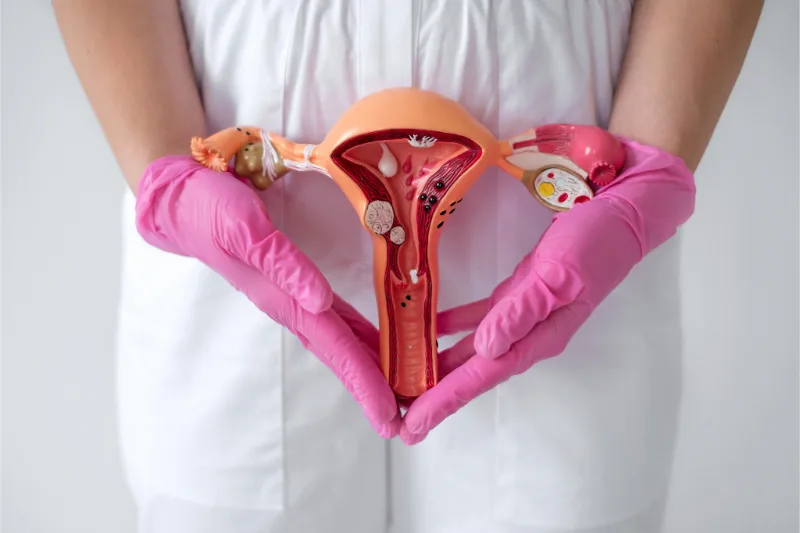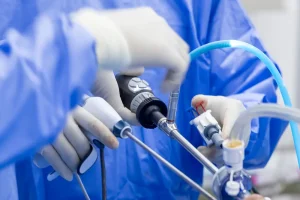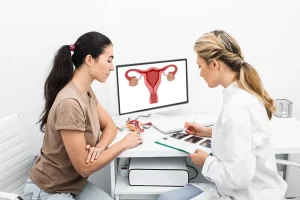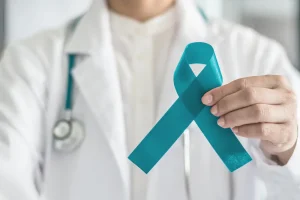Conditions Treated
Gynecological Conditions
- Ovarian cysts
- Tubal ligation
- Adhesion removal
- Incision of Bartholin's gland abscess / vaginal cyst
- Pelvic organ prolapse
- Chromoperturbation
- Bartholin's gland cystectomy / vaginal cystectomy
- Curettage biopsy
Oncological Diseases
- Cancer staging
- Omentectomy
- Pelvic and periaortic lymphadenectomy
- Ovarian transposition before irradiation

Endometriosis is a chronic gynecological disease in which tissue similar to the uterine lining grows outside the uterine cavity—on the ovaries, fallopian tubes, peritoneum, or other pelvic organs. This condition can cause severe pelvic pain, digestive problems, heavy menstruation, and infertility.
At VenArt Clinic, we offer modern, minimally invasive treatments tailored to each patient’s needs, from drug therapy to advanced laparoscopic surgery.
Book an Appointment
What you need to know about endometriosis treatment
The treatment of endometriosis depends on:
- The patient’s age;
- The severity of symptoms;
- The desire to have children;
- Response to previous therapies.
Medication
Hormone therapy: The goal is to reduce the hormonal activity that stimulates endometriotic tissue. The following are used:
- Combined oral contraceptives;
- Oral or injectable progestogens;
- Hormonal intrauterine devices (e.g., Mirena);
- GnRH agonists/antagonists (for severe forms).
Nonsteroidal anti-inflammatory drugs (NSAIDs): For pain control.
Surgical treatment
Recommended when:
- Symptoms are severe and do not respond to drug treatment;
- There is associated infertility;
- Large endometriotic cysts (endometriomas) are present.
It is usually performed laparoscopically – a minimally invasive method with rapid recovery.
Preparing for surgery
Before laparoscopic surgery, the patient must:
- Undergo the recommended preoperative tests (blood tests, EKG, anesthetic consultation);
- Discuss all options with the doctor;
- Avoid eating solid food 6–8 hours before surgery;
- Follow any instructions regarding bowel emptying (if required).
Important: On the day of the procedure, it is recommended that you do not wear jewelry, makeup, or nail polish, and that you come accompanied.
What happens during laparoscopic surgery
- Two to three small incisions are made through which the instruments and video camera are inserted.
- Endometriotic lesions are identified and removed.
- Other procedures may also be performed: release of adhesions, resection of cysts.
- Depending on the complexity, the procedure lasts 1–3 hours.
What to eat after endometriosis surgery
- In the first 24–48 hours: light meals, clear liquids, soups, compote;
- After: gradually introduce easily digestible foods – rice, boiled potatoes, chicken breast;
- Avoid: fatty foods, fried foods, whole milk products, legumes (causes bloating);
- Hydration: drink at least 1.5–2 liters of water per day.
Postoperative follow-up and prevention of recurrence
- Follow-up consultations 2–4 weeks after surgery;
- Regular ultrasound monitoring;
- Postoperative hormone treatment (in some cases) to prevent recurrence;
- A balanced lifestyle and psychological support if necessary.
Complications of endometriosis
If not treated properly, endometriosis can lead to serious complications, affecting not only the reproductive system but also the functioning of other organs:
- Infertility: one of the most common complications. Endometriosis can affect the ovaries, fallopian tubes, and uterus, reducing the chances of natural conception.
- Ovarian cysts (endometriomas): these can become large and painful, requiring surgical intervention.
- Pelvic adhesions: bands of scar tissue that can join organs together, causing pain and digestive or urinary disorders.
- Urinary or digestive impairment: in severe cases, lesions can involve the bladder, rectum, or ureters, requiring complex interventions.
- Risk of recurrence: even after surgical treatment, the disease can recur, which is why regular monitoring and maintenance treatment are essential.
Why Choose VenArt Clinic?
Trusted expertise, advanced technology, and care that puts you first — learn more about what sets our gynecology medical services apart:
- Experienced medical team: Specialists with years of practice in gynecology, with proven results and numerous positive testimonials.
- Modern technology: We use minimally invasive methods, such as laparoscopic surgery, for quick recovery and reduced discomfort.
- Personalized approach: Each patient is unique, and the treatment plan is tailored to their needs for a safe and effective medical experience.
- Comprehensive post-operative care: We provide guidance throughout recovery, careful monitoring, and answer any questions to ensure a complication-free healing process.
Medical Team
Frequently Asked Questions
Will surgical treatment affect my fertility?
On the contrary, in many cases laparoscopic surgery can improve fertility, especially if the endometriosis lesions affected the ovaries or fallopian tubes. However, in severe cases, there are risks that need to be discussed with your doctor.
Does endometriosis disappear after surgery?
Surgery can significantly reduce symptoms and lesions, but the disease may return. Therefore, monitoring and maintenance treatment are important.
Will I be able to have children?
Many patients manage to conceive naturally after treatment. If not, assisted reproduction techniques (IVF, insemination) can be used.
Is recovery painful?
Recovery is easier than with traditional procedures, and pain is effectively controlled with painkillers.
Can endometriosis be prevented?
There is no sure method of prevention, as the exact causes are not fully understood. However, early diagnosis and appropriate treatment can prevent complications.
Does endometriosis affect your sex life?
Maybe, especially in cases of deep pelvic pain. The right treatment (medication or surgery), along with psychological and sexual counseling, can help improve your intimate life.
How often should I have checkups if I have endometriosis?
It depends on the severity of the disease and the treatment followed. In general, a gynecological check-up is recommended every 6–12 months, or more frequently if new symptoms or relapses occur.







